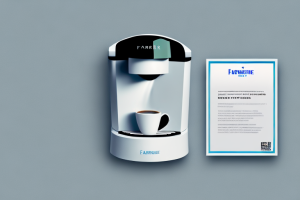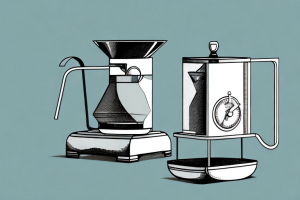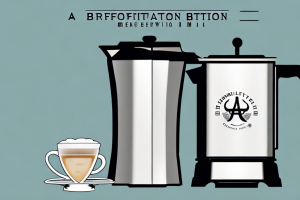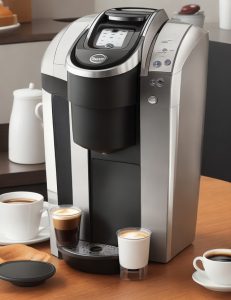Clean A Coffee Maker With Baking Soda

A coffee maker being cleaned with baking soda
Coffee is an essential part of many people’s daily routine, and having a clean coffee maker ensures that you have the perfect cup every time. While there are many ways to clean your coffee maker, one of the most effective and natural methods is using baking soda. In this guide, we’ll explain why and how to clean your coffee maker with baking soda, tips for maintaining a clean coffee maker, and troubleshooting solutions for a dirty or stained machine. Let’s get started!
Why Clean Your Coffee Maker with Baking Soda?
Over time, coffee makers can accumulate mineral deposits, oils, and residue from coffee beans that can adversely affect the taste of your coffee and the efficiency of the machine. Using baking soda to clean your coffee maker helps to remove these deposits and refreshes your machine without the use of harsh chemicals, which can damage the machine’s components and affect the flavor of your coffee.
In addition to improving the taste of your coffee and the efficiency of your machine, cleaning your coffee maker with baking soda can also help to extend the lifespan of your machine. By removing mineral deposits and other buildup, you can prevent clogs and other issues that can lead to the need for costly repairs or replacement.
Another benefit of using baking soda to clean your coffee maker is that it is an affordable and eco-friendly option. Baking soda is a natural cleaning agent that is safe for the environment and can be purchased at a low cost. By choosing to clean your coffee maker with baking soda, you can save money and reduce your environmental impact.
How Often Should You Clean Your Coffee Maker?
The frequency of cleaning your coffee maker depends on how often you use it. It’s recommended to clean your coffee maker at least once a month, regardless of the frequency of use. If you use your coffee maker daily, it’s a good idea to clean it once a week to ensure that your coffee tastes fresh and that the machine is working efficiently.
However, if you notice any unusual taste or smell in your coffee, it’s a sign that your coffee maker needs to be cleaned immediately. This could be due to the buildup of mineral deposits or mold inside the machine, which can affect the taste and quality of your coffee. In such cases, it’s recommended to deep clean your coffee maker using vinegar or a specialized cleaning solution to remove any buildup and ensure that your coffee tastes as good as new.
Understanding the Science Behind Baking Soda
Baking soda, or sodium bicarbonate, is a natural abrasive that can eliminate stains, grime, and buildup in coffee makers. When mixed with water, baking soda forms a mild alkaline solution that is effective in breaking down grease and oils. It also acts as a deodorizer, neutralizing any unpleasant odors.
In addition to its cleaning properties, baking soda has a variety of other uses. It can be used as a natural toothpaste, as it helps to whiten teeth and freshen breath. Baking soda can also be used as a natural remedy for heartburn and indigestion, as it helps to neutralize stomach acid.
Furthermore, baking soda can be used in cooking as a leavening agent. When combined with an acid, such as vinegar or lemon juice, it produces carbon dioxide gas, which causes dough or batter to rise. This makes it a popular ingredient in baked goods such as cakes, cookies, and breads.
How Does Baking Soda Clean Your Coffee Maker?
The process of cleaning your coffee maker with baking soda is straightforward and simple. Baking soda removes the mineral buildup on the inside of the coffee maker, as well as any residue on the outside of the machine. When mixed with water, baking soda forms a paste that easily penetrates difficult-to-reach places, leaving your coffee maker spotless.
In addition to its cleaning properties, baking soda also helps to eliminate any unpleasant odors that may be lingering in your coffee maker. This is especially useful if you have neglected to clean your machine for an extended period of time. Baking soda is a natural deodorizer and can effectively neutralize any unwanted smells, leaving your coffee tasting fresh and delicious.
The Benefits of Cleaning Your Coffee Maker with Baking Soda
Using baking soda to clean your coffee maker has many benefits. Firstly, it’s an eco-friendly and inexpensive alternative to cleaning chemicals that can be harmful to your health and the environment. Secondly, it ensures that your coffee tastes fresh and is free of any leftover residue. Lastly, it helps to prolong the life of your coffee maker by keeping it running efficiently and preventing the buildup of minerals and oils.
In addition to these benefits, using baking soda to clean your coffee maker is also very easy. All you need to do is mix baking soda with water and run it through your coffee maker, then rinse thoroughly. This simple process can be done regularly to keep your coffee maker in top condition.
Another advantage of using baking soda is that it is a natural deodorizer, which means it can help to eliminate any unpleasant odors that may be lingering in your coffee maker. This is especially useful if you have accidentally left coffee grounds in the machine for too long, or if you have used flavored coffee that has left a strong scent behind.
What You’ll Need to Clean Your Coffee Maker with Baking Soda
To clean your coffee maker with baking soda, you’ll need:
- Baking soda
- Water
- A soft-bristled brush or toothbrush
- Paper towels or a clean cloth
It’s important to note that before cleaning your coffee maker with baking soda, you should first remove any old coffee grounds or filters. Additionally, if your coffee maker has any removable parts, such as the carafe or filter basket, it’s a good idea to wash them separately with warm, soapy water before beginning the baking soda cleaning process. This will ensure that any built-up grime or residue is removed before you start cleaning with baking soda.
Step-by-Step Guide to Cleaning Your Coffee Maker with Baking Soda
Follow these steps to clean your coffee maker with baking soda:
- Remove any old coffee or filters from the machine and discard them.
- Add a quarter cup of baking soda to the pot.
- Add enough hot water to fill the pot and stir until the baking soda is dissolved.
- Pour the solution into the water tank of the coffee maker.
- Turn on the coffee maker and allow the solution to run through one cycle.
- Turn off the coffee maker and allow it to sit for 15 minutes to allow the solution to penetrate the machine.
- Rinse the coffee maker thoroughly with warm water.
- Use a soft-bristled brush or toothbrush to clean any hard-to-reach areas, such as the carafe and filter area.
- Rinse the brush or toothbrush with warm water and use it to scrub the outside of the machine.
- Wipe the entire machine with a clean cloth or paper towel, making sure to remove any excess residue.
It is important to clean your coffee maker regularly to ensure that it continues to function properly and produce great-tasting coffee. Neglecting to clean your coffee maker can lead to a buildup of mineral deposits, bacteria, and other contaminants that can affect the taste of your coffee and even cause health problems.
Baking soda is a great natural cleaning agent that can effectively remove stains, odors, and buildup from your coffee maker. It is also safe to use and does not contain any harsh chemicals that can damage your machine or leave behind harmful residues.
Tips for Maintaining a Clean Coffee Maker
Here are some tips to help you maintain a clean coffee maker:
- Use only clean, cold water to brew your coffee.
- Empty the carafe and discard the coffee grounds immediately after brewing.
- Wash the carafe, filter, and any removable parts of the coffee maker after each use with warm, soapy water.
- Regularly wipe down the exterior of the coffee maker with a damp cloth.
- Run a vinegar and water solution through your coffee maker every few months to remove any mineral buildup.
Additionally, it is important to descale your coffee maker regularly to ensure that it continues to function properly. Descaling involves removing the buildup of mineral deposits that can accumulate over time and cause your coffee maker to work less efficiently. You can purchase descaling solutions specifically designed for coffee makers, or you can make your own solution using equal parts water and white vinegar. Follow the instructions provided with your coffee maker to properly descale it and keep it running smoothly.
Other Natural Ways to Clean Your Coffee Maker
There are many other natural ways to clean your coffee maker. Some alternative methods to using baking soda include using white vinegar, lemon juice, or citric acid. It’s essential to follow the manufacturer’s instructions before using any of these methods as they may void the warranty or damage the machine.
White vinegar is a popular natural cleaning agent that can effectively remove mineral buildup and stains from your coffee maker. To use, mix equal parts of white vinegar and water and run the solution through your coffee maker. Repeat the process with plain water to remove any vinegar residue.
Common Mistakes to Avoid When Cleaning Your Coffee Maker
Here are some common mistakes to avoid when cleaning your coffee maker:
- Using hot water or other liquids in the water tank, as this may damage the machine.
- Using abrasive materials to clean the coffee maker, as this may scratch the surface or damage the components.
- Skipping the rinsing step, as this can cause a buildup of residue.
- Forgetting to empty the carafe or discard the coffee grounds, as this can cause mold and bacteria to grow in the machine.
However, there are a few other mistakes that people often make when cleaning their coffee makers that are worth mentioning:
- Not cleaning the exterior of the machine: While it’s important to clean the internal components of your coffee maker, it’s also important to clean the exterior. This will help prevent the buildup of dirt and grime, which can make your machine look unsightly and may even affect its performance over time.
- Using the wrong cleaning solution: Some people assume that any cleaning solution will work for their coffee maker, but this is not the case. Using the wrong cleaning solution can damage the machine or leave behind a residue that affects the taste of your coffee. It’s important to use a cleaning solution that is specifically designed for coffee makers.
By avoiding these common mistakes, you can ensure that your coffee maker stays in good condition and continues to produce delicious coffee for years to come.
Troubleshooting Tips for a Dirty or Stained Coffee Machine
If your coffee maker is still dirty or stained after cleaning it with baking soda, there are a few troubleshooting tips you can follow:
- Repeat the cleaning process with a more concentrated baking soda solution.
- Use a scrubbing sponge or brush to remove any stubborn stains or buildup.
- Soak the machine in a solution of baking soda and water for a few hours before cleaning.
- Consult the manufacturer’s instructions for specific cleaning recommendations.
Final Thoughts on Using Baking Soda to Clean Your Coffee Machine
Cleaning your coffee maker with baking soda is a simple, effective, and natural way to keep your machine in good working order and ensure that your coffee tastes fresh every time. With a little bit of effort and the right materials, you can keep your coffee maker looking and functioning like new.



